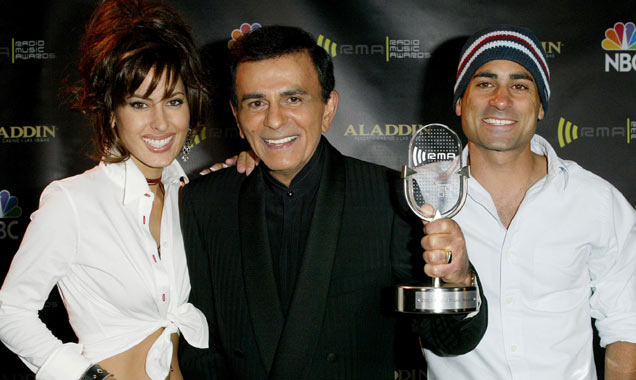Casey Kasem Laid To Rest in Bel Air Funeral
By Lauren James in Lifestyle / Showbiz on 23 June 2014
Mourners heard the legendary broadcaster's voice once more before he was laid to rest.
Casey Kasem has been laid to rest in a private funeral in Bel Air that took place on Saturday (21st June). Mourners gathered to pay their respects to the late radio star and voice actor and were met with a recorded tribute to Kasem's lengthy showbiz career. Kasem died on Sunday 15th June after a long illness aged 82.
 Casey Kasem [Centre] and his kids in 2003 [Photo: Getty Images, Credit: Carlo Allegri]
Casey Kasem [Centre] and his kids in 2003 [Photo: Getty Images, Credit: Carlo Allegri]
A rep for the family, Danny Deraney told The AP that about 100 family members, close friends and business associates gathered at the memorial at a church in the Bel Air neighbourhood. Clips from Kasem's old radio shows, including American Top 40 were played to remember the talented and distinctively-voiced media icon.
Funeral attendees heard the late DJ introduce music by Jimi Hendrix, Joni Mitchell and the Bee Gees in his characteristically warm and sincere style. Additionally, Kerri, Mike and Julie - three of Kasem's four children - spoke, and pop music arranger David Campbell performed a violin version of Stephen Sondheim's 'Send in the Clowns,' which was one of Kasem's favourite songs.
"The children - Kerri, Mike, Julie and Julie's daughters gave speeches in addition to his close friends and brother," Deraney said. "The day ended with a wonderful video presentation created by Mike Kasem," the rep added.
More: New 'Scooby Doo' movie announced in wake of Casey Kasem's death.
Kasem's wife, Jean, and her daughter Liberty were notable absentees at the ceremony, perhaps owing to a bitter dispute over Kasem's care in the period before his death. Jean clashed with Kasem's daughter from his former marriage, Kerri, who wanted to see through the wishes outlined in her father's will.
The longtime radio host and voice of Scooby Doo's Shaggy had been diagnosed with Lewy body dementia, an illness closely associated to Parkinson's disease that robbed him of his ability to speak in the months before his death.
More: Casey Kasem dies - remembering the voice of rock 'n' roll and Shaggy.
Kerri and her siblings made the controversial decision to see out their father's wishes for comfort-oriented care if the extension of his life "would result in a mere biological existence, devoid of cognitive function, with no reasonable hope for normal functioning"; a decision that Jean fought hard against.
Contactmusic
Suggested

Pretty Fierce talk to us about collaborating with Doja Cat, emetophobia, arena tours and staying "true to yourself" [EXCLUSIVE]
Sheffield's very own all girl group Pretty Fierce are still on a high after the recent release of their debut single - 'Ready For Me'.

Will Varley & Jack Valero - The Astor Theatre Deal Live Review
Three nights before the end of his current tour Will Varley returned to his home town of Deal to delight a sold out crowd in The Astor Theatre.

WYSE talks to us about her "form of synaesthesia", collaborating with Radiohead's Thom York and the prospect of touring with a band [EXCLUSIVE]
With only a few days to go before Portsmouth based songstress and producer WYSE releases her new single, 'Belladonna', we caught up with her to find...

Bay Bryan talks to us about being a "wee queer ginger", singing with Laura Marling and being inspired by Matilda [EXCLUSIVE]
Colorado raised, Glasgow educated and Manchester based Bay Bryan is nothing if not a multi-talented, multi-faceted artist performing as both...
Advertisement

Keelan X talks to us about staying true to "your creative vision", collaborating with Giorgio Moroder and being "a yoga nut" [EXCLUSIVE]
Former Marigolds band member Keelan Cunningham has rediscovered his love of music with his new solo project Keelan X.
![Luke De-Sciscio talks to us about having the courage to be yourself, forgiving that which is outside of one's control and following whims [EXCLUSIVE] Luke De-Sciscio talks to us about having the courage to be yourself, forgiving that which is outside of one's control and following whims [EXCLUSIVE]](/images/home/homepage/luke-de-sciscio-abof-a.jpg)
Luke De-Sciscio talks to us about having the courage to be yourself, forgiving that which is outside of one's control and following whims [EXCLUSIVE]
Wiltshire singer-songwriter Luke De Sciscio, formally known as Folk Boy, is set to release is latest album - 'The Banquet' via AntiFragile Music on...

Annie Elise talks to us about the challenges a female producer has to face and "going through a year of grief and sickness" [EXCLUSIVE]
Electronic music pioneer and producer Annie Elise says that the release of her first EP - 'Breathe In, Breathe Out' feels "both vulnerable and...
![Dekker talks to us about writing with Jose Gonzales, making headway in the U.S and the difficulties associated with wearing a hat! [EXCLUSIVE] Dekker talks to us about writing with Jose Gonzales, making headway in the U.S and the difficulties associated with wearing a hat! [EXCLUSIVE]](/images/home/homepage/dekker-abof-a.jpg)
Dekker talks to us about writing with Jose Gonzales, making headway in the U.S and the difficulties associated with wearing a hat! [EXCLUSIVE]
Ahead of the imminent release of his second solo album - Dekker, aka Brookln Dekker, took time out to let us know about the musical project he...
Advertisement

